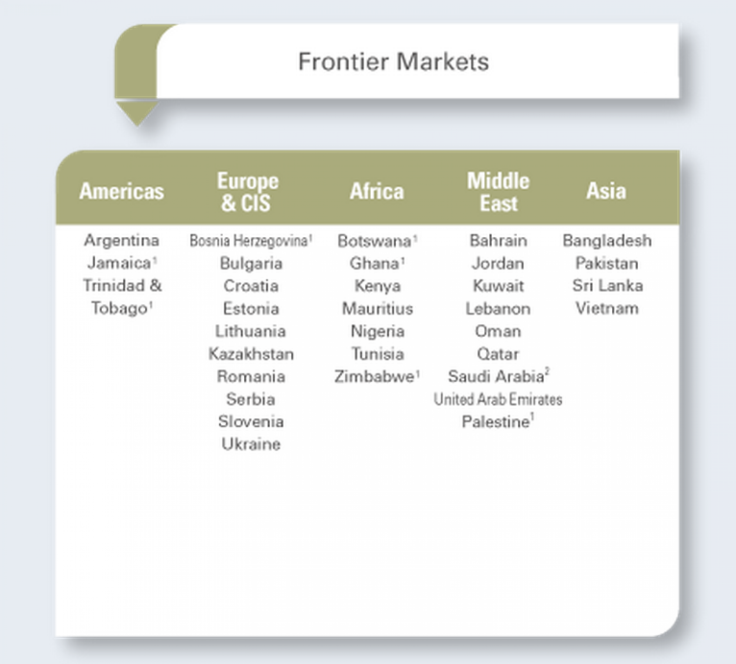Forget Emerging Markets: Welcome Frontier Markets, For Brave Stock And Bond Investors

After emerging markets saw currency volatility and cash outflows amid Federal Reserve tapering talk this summer, attention has shifted to so-called frontier markets, where savvy investors may make better returns.
U.S. hedge fund manager Kyle Bass, of Hayman Capital Management L.P., for instance, sees a strong investment case to be made for Argentina, reports the Financial Times.
“Argentina’s problems can be fixed in two years,” he said at a conference in September. “Now is the time to start investing.”
Frontier markets include those with high growth potential, but immature and illiquid markets. Many have abundant natural resources and low labor costs, according to frontier market specialist Tomas Guerrero.
Prominent frontier markets include Argentina, Nigeria, Ukraine, Pakistan and Vietnam. Frontier markets span most of the continents, and contrast with the emerging markets of BRIC fame – namely Brazil, Russia, India and China.
Frontier market bonds have done well since the financial crisis and also outperformed volatile emerging markets in the context of fears of decreasing Federal Reserve stimulus. The MSCI Frontier Markets index rose more than 17 percent in 2013 so far, beating the 2.9 percent decline in the MSCI Emerging Markets index.

“You would think that talk of Fed tapering and the flight from risk would hit frontier markets, but they have kept on tightening,” said Gabriel Sterne, an economist at the Exotix brokerage, to the FT.
Guerrero points out that the MSCI Frontier Market index rose 13.3 percent in the first five months of 2013, the best opening stretch since the index launched. A parallel emerging markets index fell 4.4 percent over the same period.
He adds that equity funds specializing in frontier markets hit an investment record in May 2012, reaching $2.27 billion.
The long-term bull case for frontier markets involves their exploding population and effective natural resource exploitation. Tech hubs in places like Kenya and Jordan could also spur industrial and trade growth.
Stock markets to watch include the United Arab Emirates, Iraq, Pakistan and Vietnam, according to a Citigroup Inc. (NYSE:C) note earlier this month. African equity market prospects are muted, this year, though.
There’s notably more investor demand than there are frontier market stocks to invest in, according to the note. Capital-intensive consumer and industrial companies and private equity exits, especially in sub-Saharan Africa, are two spaces to watch, which could spur equity issuance.
Frontier markets fell further during the financial crisis, though, and are still down 50 percent below pre-crisis peaks. Emerging markets are down less than 20 percent from pre-crisis peaks.
Invest at your own risk, too, in frontier market bonds. They tend to have lower investment grades from influential credit raters like Moody’s Corp., which means their creditworthiness is low. There’s a risk governments could skip scheduled payments.
These bond markets also tend to be illiquid, meaning it’s hard to smoothly buy and sell positions.
Still, frontier markets have outperformed emerging markets by 18 percent for the year to date, according to Citi. Investment researcher Morningstar, Inc. (NASDAQ:MORN) also said some frontier market funds have seen “eye-popping” organic growth rates, of 200 to 300 percent.
“These countries are starting to consolidate as a real alternative to developing economies in terms of direct foreign investment,” wrote Guerrero. “… Frontier Markets are the real alternative to Emerging Markets. Shall we take advantage of them?”
© Copyright IBTimes 2024. All rights reserved.




















